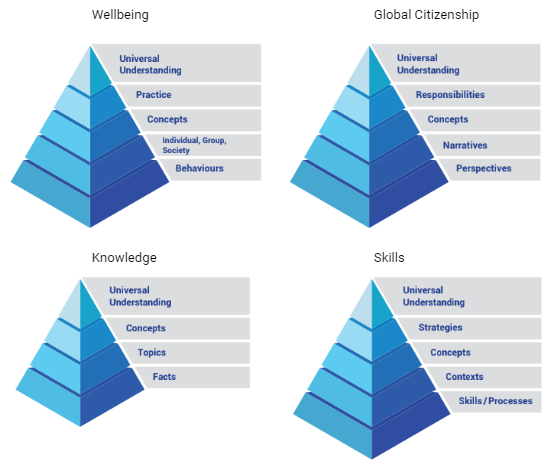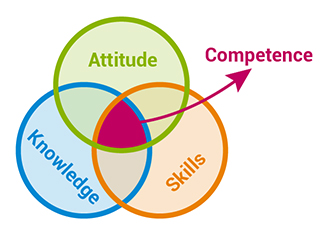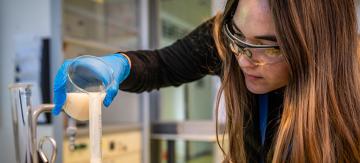What is the Universal Learning Programme?
The ULP educational approach, designed by leading researchers, neuroscientists and curriculum experts, is focused on the development of competences and deep conceptual understanding. The ULP works through projects, assessments and learning adventures that stimulate and nurture character, passion, mastery and collaboration within each learner and throughout the school.
The programme is all about teaching for understanding as opposed to teaching for the sake of knowledge. A considerable amount of time and effort is dedicated to ensuring that students understand what they are learning.
Universal Understandings are the ULP’s approach to the structuring of knowledge and skills. In order to see how ideas are connected and how knowledge can be grouped in big ideas, we need to stand back from our learning to take it all in.
In order to understand how Universal Understandings are formed, we have developed four Universal Understanding Pyramids.

When we do this, we are able to see knowledge, skills, citizenship and wellbeing grouped in concepts. This allows us to organise, analyse, and engage with information in a complex world.
Universal Questions: every year students and teachers design four powerful transdisciplinary questions that are posted around the school and answered in the classroom. Examples of Universal Questions that the school has designed and answered include: What makes something beautiful? What makes something meaningful? What does it mean to be human?
Competence Development and Assessment
 A competence is a combination of knowledge, skills and attitude. These seven competences were identified by some of the world’s top researchers and practitioners UNESCO IBE.
A competence is a combination of knowledge, skills and attitude. These seven competences were identified by some of the world’s top researchers and practitioners UNESCO IBE.
The competences that drive learning in our curriculum are grouped into four themes, each driven by a guiding question.
- Character (Who am I?)
Through coaching, positive psychology, setting values-based challenges and reflecting on outcomes, we bring out our true potential by developing character, associated with grit, intellectual honesty, accountability and humane moral values.
- Passion (What is my purpose?)
Learning is governed by emotions and set in a social context. By designing emotional hooks and caring relations, by making learning personally relevant and by paying homage to the beauty of content, we develop passion for learning.
- Mastery (How can I go further?)
Higher order thinking and transfer emerge from strong domain knowledge. Skills grow out of knowledge and both are harnessed through ongoing, spaced and deliberate practice. Mastery is core to our programme. Mastery enhances disciplinary and transdisciplinary fluency, learning how to learn, cultural awareness and deed understandings.
- Collaboration (How can we work together?)
What we learn must be put to a greater good that will reverse our anthropocene, selfish behaviour. This means much more emphasis on community service, learning to live together and, collectively, respecting resources and, ultimately, ourselves. Collaboration entails effective teamwork, balancing rights with privileges, responsible consumption, followship, leadership, listening skills, negotiation and interpersonal sensitivity.
Social Impact
In the ULP, Social Impact is the ultimate expression of a learner’s understanding. Real-world application offers a learner the opportunity to test how their understanding fares when it bumps into the full complexity of the world. Transdisciplinarity, Service Learning and STEM projects are curriculum points that offer meaningful engagement with the full complexity of the world.
Examples of ULP projects that have a meaningful social impact
- The Character Project (Year 9) - the project develops students’ tenacity, solution seeking, anti-fragility but also their moral compass, empathy and reflection on humanity. Students set themselves 3 personal challenges:
- A physical challenge that develops mental toughness, self-esteem and self-efficacy.
- A cognitive challenge based on the discussion and analysis of current affairs, that develops personality, identity and self-discovery.
- An emotional challenge, based on community service action which develops humility, empathy and open-mindedness.
- The Passion Project (Year 10) - students take a personal passion (whether it is in or out of school) and put it into a social impact project related to a sustainable development goal. This helps students learn about project design, entrepreneurship and connecting school with what they love.
- The Mastery Project (Year 11) - students follow an extended mathematics course and create their own transdisciplinary mathematics and social science project where they learn about statistical modelling and apply this knowledge to indices related to wealth, happiness, mobility and demographics. This allows students to make meaningful connections between an academic domain and its relationship with society.
- Service Learning - every ULP student must be involved in a meaningful service learning project. Our philosophy about service learning is that you do not just learn to serve, but you serve to learn too by enriching yourself through contact with other people.
Assessment
In the ULP, competences are most effectively assessed within the context of a given project. The selection of competences for assessment directly influences a student's behaviour and approach to the project.
For instance, in a project like "creating a website," if the agreed competences for assessment are "Communication" and "Teamwork," the student will prioritise and focus on enhancing these skills.

Hence, if "Teamwork" is replaced with "Leadership," the student's behaviour and project management style will likely shift accordingly.

It's essential to establish clear expectations for the behaviours associated with each competence. This collaborative process involves both the teacher and the student in defining what "process-oriented," "inspiring," or "self-oriented"... behaviours entail. By jointly determining the most critical competences for assessment in a project, students are actively engaged and have a vested interest in their learning outcomes.
